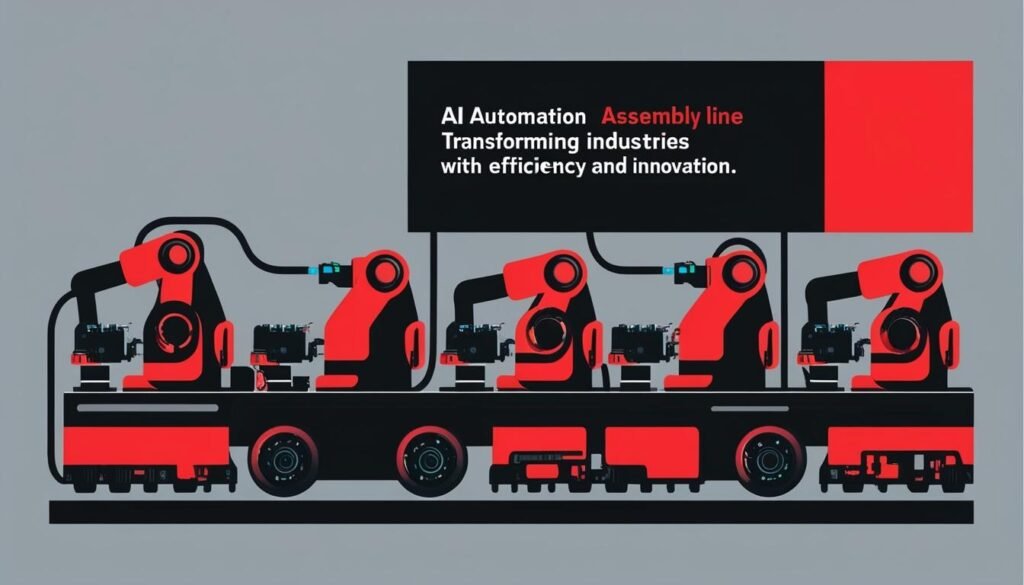Businesses across multiple sectors are embracing AI automation to improve efficiency, productivity, and customer satisfaction, revolutionising traditional operations.
Businesses across various sectors are increasingly adopting artificial intelligence (AI) automation to streamline operations and drive growth. The implications are vast, impacting efficiency, productivity, and ultimately, customer satisfaction.
In the manufacturing industry, companies are implementing AI to enhance production processes. For instance, AI-enabled robots are now capable of performing complex assembly tasks that were previously manual, thereby reducing errors and increasing output speed. Automation in manufacturing not only optimises resource management but also results in significant cost savings. By integrating AI systems, businesses can predict maintenance needs and avoid costly downtimes, thus ensuring smoother operations.
The retail sector is also seeing a substantial shift due to AI technologies. Businesses are deploying AI-driven analytics to understand consumer behaviour better. For example, personalised marketing strategies are being developed through AI algorithms that analyse buying patterns, enabling retailers to target their customers more effectively. Moreover, inventory management has benefited from AI as it can forecast demand trends, allowing retailers to maintain optimal stock levels and reduce wastage.
In the realm of finance, AI is making headway in automating key processes, such as fraud detection and risk assessment. Financial institutions are employing machine learning algorithms to analyse transaction patterns in real-time, identifying potentially fraudulent activities more swiftly than traditional methods. This proactive approach not only safeguards the institution’s assets but also bolsters customer trust.
Healthcare is witnessing a revolutionary transformation through AI applications. AI-powered tools are assisting in diagnostics and analysing medical images with remarkable accuracy. The ability to process large volumes of patient data fosters more accurate treatment recommendations and personalised care plans. Automating administrative tasks within hospitals, such as appointment scheduling and patient record management, allows healthcare professionals to focus more on patient care.
The logistics sector is harnessing AI to improve route optimisation and delivery tracking. Companies are utilising AI systems to analyse traffic patterns and weather conditions, dynamically adjusting routes to ensure timely deliveries. This leads to enhanced operational efficiency and improved customer service.
The application of AI automation is not limited to large enterprises; small and medium-sized businesses are also taking advantage of these technologies. Many are leveraging cloud-based AI solutions that are cost-effective and scalable, ensuring that businesses of all sizes can benefit from the efficiencies that AI integration offers.
A notable example cited by the Business Post highlights how AI is transforming customer service across industries. Companies are deploying chatbots and virtual assistance powered by AI to handle customer inquiries. This shift not only provides immediate support to customers but also reduces the burden on human resources, allowing staff to engage with more complex issues that require personal attention.
Overall, the advancements in AI automation present numerous opportunities for businesses to enhance their operational efficiency and drive significant growth. The widespread adoption of AI technologies is likely to continue altering traditional business models, leading to innovative approaches in various sectors.
Source: Noah Wire Services
- https://edgedelta.com/company/blog/ai-adoption-by-companies – Corroborates the widespread adoption of AI by companies across various sectors, including the percentages of companies adopting AI and the benefits in terms of efficiency and productivity.
- https://edgedelta.com/company/blog/ai-adoption-by-companies – Provides data on the adoption rates of AI in different industries, such as financial services being significant early adopters.
- https://www.tidio.com/blog/customer-service-chatbot/ – Highlights the use of AI-powered chatbots in customer service, such as those used by Domino’s Pizza, Bank of America, and Sephora, to enhance customer interactions and streamline operations.
- https://www.tidio.com/blog/customer-service-chatbot/ – Examples of how AI chatbots are used in various industries to provide immediate customer support and reduce the burden on human resources.
- https://www.commerce.nc.gov/news/the-lead-feed/what-industries-are-using-ai – Details the current and future AI adoption rates across different sectors, including manufacturing, retail, and finance.
- https://www.commerce.nc.gov/news/the-lead-feed/what-industries-are-using-ai – Provides insights into how AI is being used in sectors like information and professional services, and the projected increase in AI adoption.
- https://edgedelta.com/company/blog/ai-adoption-by-companies – Discusses the use of AI in predicting maintenance needs and avoiding costly downtimes in manufacturing, which aligns with the optimization of resource management and cost savings.
- https://www.tidio.com/blog/customer-service-chatbot/ – Illustrates how AI-driven analytics in retail help in understanding consumer behavior and developing personalized marketing strategies.
- https://edgedelta.com/company/blog/ai-adoption-by-companies – Explains the role of AI in automating key financial processes such as fraud detection and risk assessment, enhancing customer trust and safeguarding assets.
- https://www.tidio.com/blog/customer-service-chatbot/ – Shows how AI is used in logistics for route optimization and delivery tracking, similar to the dynamic adjustments based on traffic and weather conditions.
- https://edgedelta.com/company/blog/ai-adoption-by-companies – Mentions the use of cloud-based AI solutions by small and medium-sized businesses, highlighting their cost-effectiveness and scalability.
















